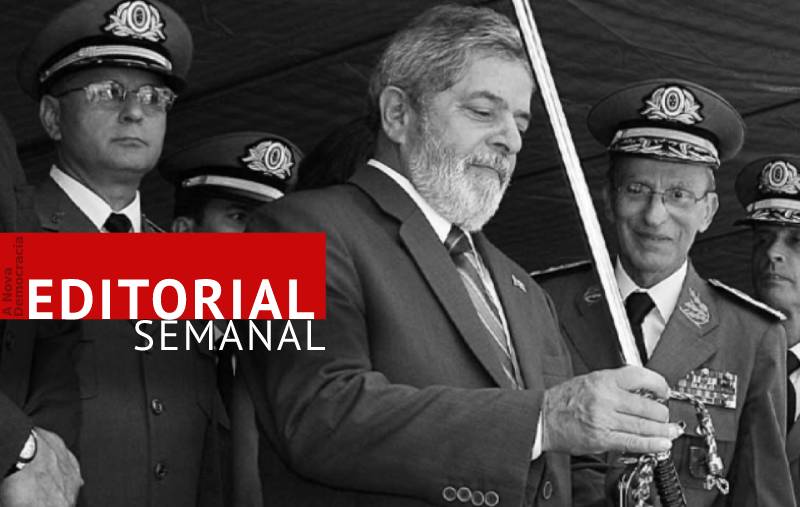AND Weekly Editorial – The tasks of the new shift government
Editorial Staff of AND
05 January 2023
Weekly Editorial – The tasks of the new shift government

Illustrative photo. AND Database
The inauguration of Luiz Inácio, on the 1st, took place with a veritable apparatus of war. According to the press monopoly, the security arrangements for the inauguration exceeded by more than four times the volume of personnel normally involved in previous events of the same type. The fear of a political attack was present at all times, and nothing indicates that it will subside. This fact is like a portrait of the situation: institutions are fighting and breaking down; the political forces in society are becoming extreme and exacerbated; order and the “rules of the game” are questioned, and violence takes over. Luiz Inácio, having fulfilled the first of his difficult tasks – taking office -, now has before him the challenge of fulfilling the three reactionary tasks that Bolsonaro’s military government failed to carry out: to pull the country out of the colossal crisis and give a boost to bureaucratic capitalism, to centralize power as much as possible in the Executive branch, and to conjure up the danger of revolution, presiding over the repression of the revolutionary movement of the masses that is on the march to erupt. In short, a new government of the big bourgeoisie and landowners, servants of imperialism, principally North American, under the tutelage of the coup-plotting generals.
It is striking, as part of the institutional and military political crisis in the state apparatus, that the high commanders of the three reactionary Armed Forces have left office before the inauguration. They did so in order not to have to salute the new president, nor to be subject to his appointments. The new top bosses, who Lula wanted to appoint, were appointed by Bolsonaro.
It is the high commanders of these reactionary Armed Forces who have instigated this anti-communist movement of the barrack dwellers, to give a blunt message to the new administration, or rather, a blunt blackmail: either you submit to the secret military government that operates as the Moderator Power, recognising it as such, or get ready for years of unrest of all kinds.
The political attacks which have taken place since 30 October, in particular the attempted explosion of a tanker truck heading towards Brasilia Airport, are signs of the new cycle of class struggle which has opened up in the country. The celerated far right sharpens its swords to strike at the mass movement of the people and the revolutionary movement, and also to bleed the incoming government, which it considers “leftist” and even “communist”, in a great injustice to Luiz Inácio, because, as he himself decrees, “the bankers and the mill owners have never made so much money as they have under my government”.
It is certain that Luiz Inácio will try to repeat the feat, but 2023 is not 2003 and smells more like 2013, with an even more explosive situation. To manage the deep crisis of bureaucratic capitalism in the country within a world situation of growing disorder is a very complicated task to carry out. The nomination of a semi-Bolsonarist, José Múcio, to the Ministry of Defence is surrender in the form of conciliation with the coup d’état tutelage, which only feeds it. Giving his calling card, the new minister stated that “the camps in front of the Army HQ are acts of democracy”; meanwhile, investigations have shown that the delinquents who intended to explode a truck full of fuel came out of there. Is this the government that emerged from an electoral campaign based on the defence of democracy, or the Old Order of exploitation and oppression secularly in force?
The Old Order is being questioned, from top to bottom. Even in the same reactionary coalition government there is no cohesion; no cohesion between the institutions; no cohesion within any institution; no cohesion between the institutions and the popular masses. There is no reasonably possible order or peace. Conflict, between the ultra-reactionary bands, between the ultra-reactionary bands and the coalition government of opportunism with the liberal right, and between the entire old state and the popular masses, is the only certainty of this coming period. But within the truly democratic and popular forces, there will inevitably be struggles between following the revolutionary path, of acting independently in defence of democratic rights and liberties and for better living conditions, against the opportunist path of serving as a submissive official and corporatised mass movement, preached by cheap reformism and the renegade revisionism of the defenders of the current rotten “Democratic State of Law”, in unison with the appeals for order and peace of the liberal right wing. The struggles will impose themselves and the Revolution will leap forward.